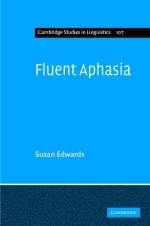
Fluent Aphasia
Seiten
2005
Cambridge University Press (Verlag)
978-0-521-79107-6 (ISBN)
Cambridge University Press (Verlag)
978-0-521-79107-6 (ISBN)
Fluent aphasia is a language disorder that follows brain damage, severely impairing the speaker's ability to communicate. In this informative study, Susan Edwards provides a detailed description of fluent aphasia, by drawing on a range of research data and looking at extensive examples of aphasic speech.
Fluent aphasia is a language disorder that follows brain damage, causing difficulty in finding the correct words and structuring sentences. Speakers also experience problems in understanding language, severely impairing their ability to communicate. In this informative study Susan Edwards provides a detailed description of fluent aphasia, by drawing widely on research data, and by comparing fluent aphasia with other types of aphasia as well as with normal language. She discusses evidence that the condition affects access to underlying grammatical rules as well as to the lexicon, and explores the relationship between language and the brain, the controversy over aphasia syndromes, the assessment of aphasia via standardized tests, and the analysis of continuous speech data. Extensive examples of aphasic speech are given, and the progress of one fluent aphasic speaker is discussed in detail. Written by an internationally renowned expert, this book will be invaluable to linguists and practitioners alike.
Fluent aphasia is a language disorder that follows brain damage, causing difficulty in finding the correct words and structuring sentences. Speakers also experience problems in understanding language, severely impairing their ability to communicate. In this informative study Susan Edwards provides a detailed description of fluent aphasia, by drawing widely on research data, and by comparing fluent aphasia with other types of aphasia as well as with normal language. She discusses evidence that the condition affects access to underlying grammatical rules as well as to the lexicon, and explores the relationship between language and the brain, the controversy over aphasia syndromes, the assessment of aphasia via standardized tests, and the analysis of continuous speech data. Extensive examples of aphasic speech are given, and the progress of one fluent aphasic speaker is discussed in detail. Written by an internationally renowned expert, this book will be invaluable to linguists and practitioners alike.
Susan Edwards is Professor of Clinical Linguistics at the School of Linguistics and Applied Language Studies, University of Reading.
1. Fluent aphasia: identification and classic descriptions; 2. Descriptions of fluent aphasia; 3. Assessment and fluent aphasia; 4. Connected fluent aphasic speech; 5. Non-fluent and fluent aphasic speech; 6. Comprehension and processing problems in fluent aphasia; 7. The manifestation of fluent aphasia in one speaker; 8. Some concluding thoughts.
| Erscheint lt. Verlag | 29.9.2005 |
|---|---|
| Reihe/Serie | Cambridge Studies in Linguistics ; Vol.107 |
| Verlagsort | Cambridge |
| Sprache | englisch |
| Maße | 152 x 229 mm |
| Gewicht | 530 g |
| Themenwelt | Geisteswissenschaften ► Sprach- / Literaturwissenschaft ► Sprachwissenschaft |
| Medizin / Pharmazie ► Medizinische Fachgebiete | |
| ISBN-10 | 0-521-79107-3 / 0521791073 |
| ISBN-13 | 978-0-521-79107-6 / 9780521791076 |
| Zustand | Neuware |
| Haben Sie eine Frage zum Produkt? |
Mehr entdecken
aus dem Bereich
aus dem Bereich
Das umfassende Standardwerk auf der Grundlage der aktuellen amtlichen …
Buch | Hardcover (2024)
Duden (Cornelsen Verlag)
35,00 €


